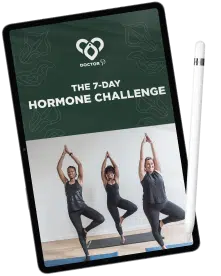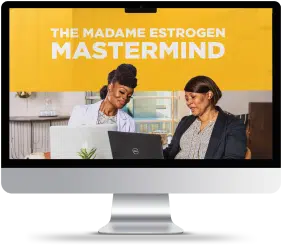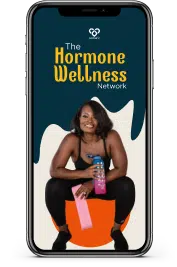WOMEN'S HEALTH
It’s Depression Awareness Month and Health Screening Month. Here are 7 yearly health screenings every woman needs.
October Reminders: Mental Health and Yearly Health Screenings Every Woman Needs
September 8, 2025
Every October, I find myself reflecting on my own journey as both a mom and an OB-GYN. After I had my Rayne, I’ll admit, I sort of put my own health on the back burner. Between night feedings, diaper changes, and trying to keep up with work, scheduling my doctor’s appointments felt almost impossible. I told myself I’d get to it “next month.” But next month turned into several months, and I realized that while I was pouring into everyone else, I wasn’t checking in on myself. (Don’t worry, I got myself back on track!)
That’s why October hits home for me. It’s both Depression Awareness Month and Health Screening Month, a powerful reminder that women need to care for their mental and physical health, especially after pregnancy and through the different stages of life. As an OB-GYN, I want to share the yearly health screenings and check-ins I recommend for women, not just occasionally, but annually.
7 Yearly Health Screenings Every Woman Needs
When life gets busy, it’s easy to push your own check-ups to the bottom of the list, but yearly screenings are the foundation of prevention. These simple tests can catch problems early, protect your long-term health, and give you peace of mind. Here are seven that every woman should prioritize.
1. Mental Health Screening
We don’t talk about this topic enough: our mental health. Postpartum depression is common, but depression can affect women at any stage of life. A simple screening questionnaire at your annual visit can help identify if you’re struggling with depression. If you’ve had a baby in the past year (or even several years ago), don’t downplay mood changes, anxiety, or fatigue. Please bring it up. Your provider can connect you to support, therapy, or medication if needed.
2. Pap Smear and HPV Screening
Pap smears are still one of the best tools for preventing cervical cancer. For most women, screening starts at 21 and continues every 3 years, unless combined with an HPV test, which can stretch it to every 5 years. After having children, it’s easy to skip these visits, but staying consistent matters.
3. Breast Exams and Mammograms
If you’re 40 or older, yearly or biannual mammograms are usually recommended, depending on your risk factors. But self-breast awareness should start earlier; knowing what “normal” feels like for you helps you notice any changes quickly. After pregnancy and breastfeeding, breast tissue can feel different, so don’t ignore new lumps, pain, or skin changes.
4. Blood Pressure and Cholesterol Checks
Pregnancy can put stress on your cardiovascular system, and conditions like gestational diabetes or preeclampsia increase long-term risks for heart disease. Women often don’t realize this link. After pregnancy, and especially by your 30s, it’s essential to have your blood pressure and cholesterol checked yearly.
5. Blood Sugar Screening
Gestational diabetes increases your chance of developing type 2 diabetes later in life. If you’ve ever had it, you’ll need routine blood sugar screenings. Even without a history, I recommend a check at least once every 3 years, more often after 40 or if other risk factors are present.
6. Bone Density (for Later Years)
While not a yearly test, I always remind women that bone density screening becomes especially important after menopause. Estrogen protects bone strength, and once levels drop, osteoporosis risk rises. Prevention (through screenings, calcium, vitamin D, and weight-bearing exercise) is far easier than treatment after a fracture.
7. Pelvic Exam
Even if you’re not due for a Pap smear, a pelvic exam can help detect fibroids, prolapse, or ovarian issues, especially if you’ve had kids. I’ve had patients come in years after childbirth with symptoms they thought were “just part of being a mom” (like leaking urine or pelvic pressure), only to learn it was something treatable.
Screenings You Don’t Need Every Year—But Shouldn’t Skip
Some screenings don’t have to be done annually, but they’re still crucial for protecting your long-term health. Here are a few I always remind my patients about:
- Colonoscopy – Starting at age 45 (earlier if you have a family history), this screening checks for colon cancer. If your results are normal, you may only need it every 10 years, but it’s one you don’t want to miss.
- Thyroid Function Test – Especially important for women after pregnancy, since thyroid issues can sneak up and mimic postpartum fatigue or mood changes. You may not need it every year, but if you’ve had symptoms or a history of thyroid disease, ask about it.
- Bone Density Scan (DEXA) – Typically recommended for women over 65, but sooner if you’ve had early menopause, a history of fractures, or risk factors like family history or long-term steroid use. This test helps catch osteoporosis before it leads to broken bones.
- Skin Cancer Screening – Not necessarily yearly unless you’re high-risk, but a full-body skin check every couple of years is smart, especially if you’ve spent a lot of time in the sun.
- Hepatitis C and HIV Testing – These are often one-time screenings, but they’re important. Depending on risk factors, your provider may recommend repeating them.
- Eye Exams – Vision changes often sneak up on women in their 40s. Eye exams aren’t just about glasses. They can detect early signs of glaucoma, diabetes, or high blood pressure.
- Hearing Test – Usually not top of mind, but hearing loss can affect balance, communication, and even cognitive health. Most women can wait until their 50s or 60s unless symptoms arise.
October isn’t just about pumpkins and fall colors, although I do love sweater weather! It’s about a yearly reminder to check in with yourself. Depression screenings, Pap smears, mammograms, bloodwork, they aren’t just boxes to check; they’re lifesaving tools.
Consider this your sign to pick up the phone and schedule those appointments. Because when we care for ourselves, we’re stronger for everyone else who depends on us.
What's Next?
Are you tired of feeling drained, moody, or just not like yourself, and no one seems to give you real answers?
You don’t have to keep pushing through and guessing what’s wrong. The Ultimate Hormone Assessment is designed to give you clarity about what your body is trying to tell you. With a simple 48-question quiz, you’ll uncover the root of your symptoms and receive a personalized action plan created to help you finally feel balanced again. Right now, you can get it all for just $99 (before the price jumps to $399). Don’t wait another day to start feeling like yourself again! Claim your assessment today and begin your transformation!
The 7-Day Hormone Challenge
Instantly access actionable steps and data-driven strategies to conquer hormonal imbalance and gain quick wins day by day!
The Ultimate Hormone Assessment
Understand your hormonal imbalance type with our signature 48-question quiz, designed to uncover the root of your symptoms!
The Madame Estrogen Mastermind
Access a comprehensive solution to say goodbye to your hormonal imbalance!
The Hormone Wellness Network
Embody hormone harmony. Unleash your inner wonder woman — masterclasses, accountability, sisterhood, access to Doctor P, and more!




